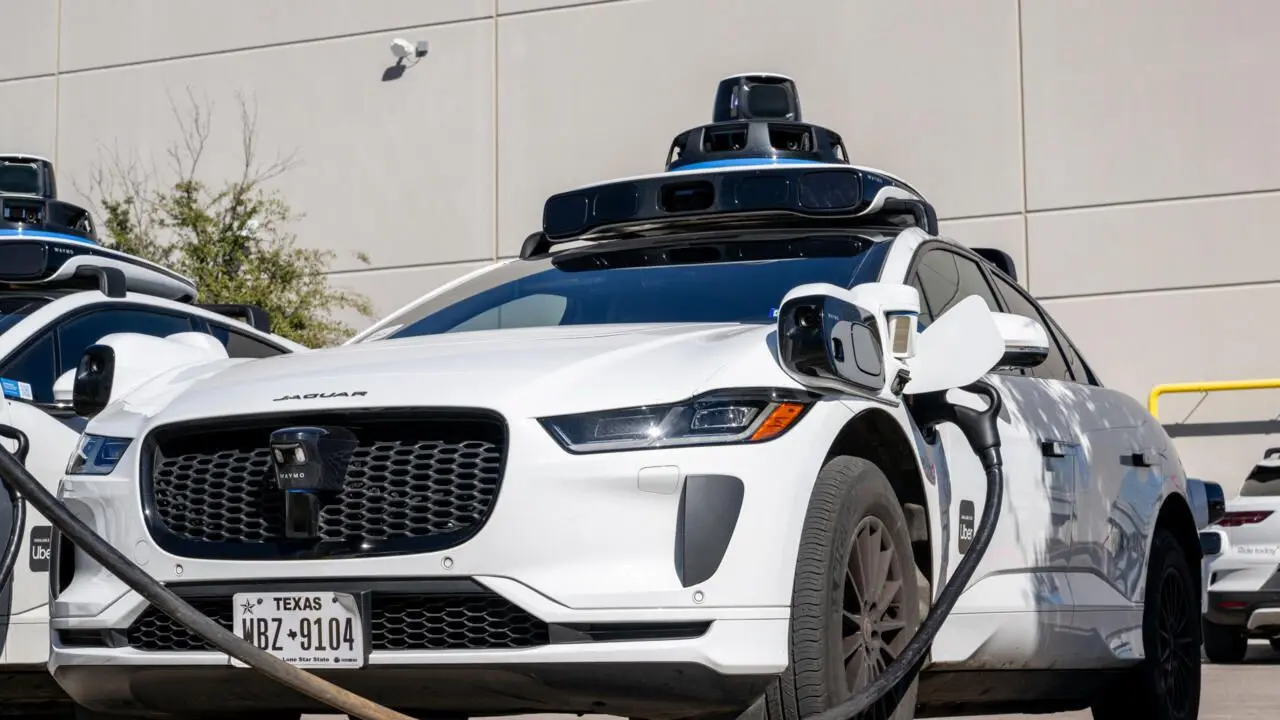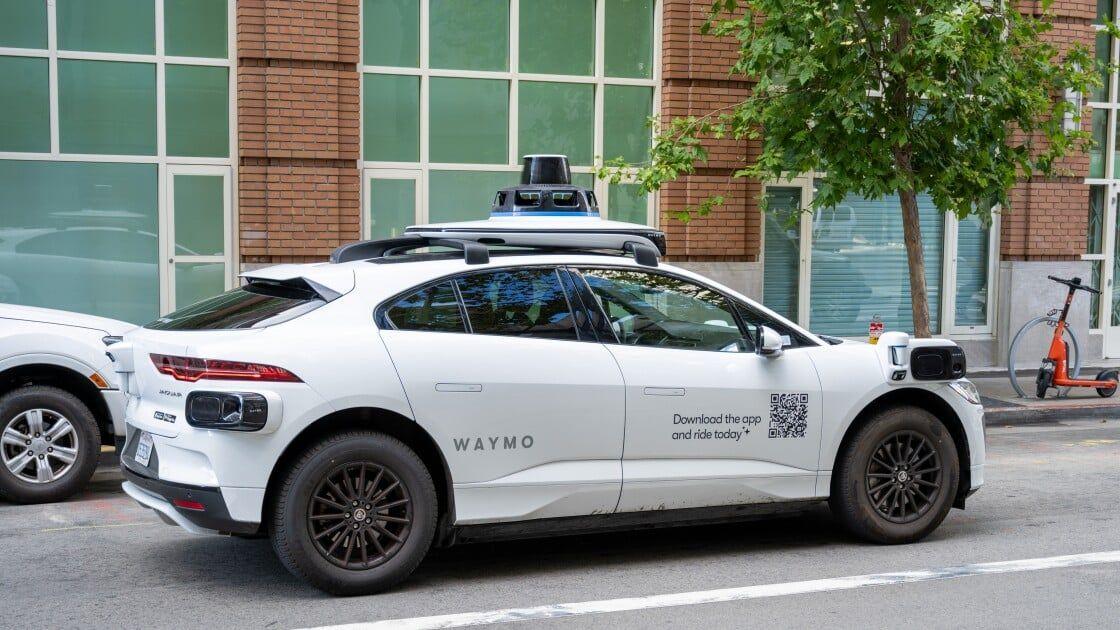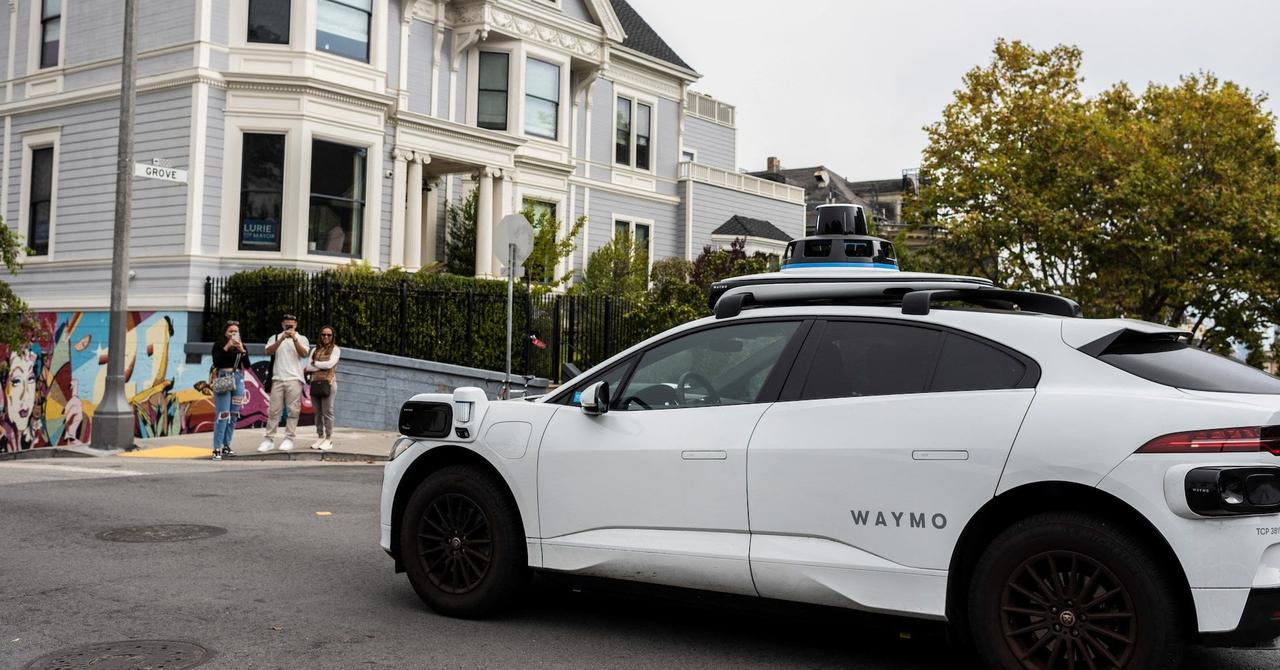Waymo Secures $5.6 Billion in Funding, Accelerating Autonomous Vehicle Development and Expansion
5 Sources
5 Sources
[1]
Waymo closes $5.6 billion funding round from Alphabet, others
Waymo is one of a large pack of companies pursuing robotaxi services in the US. It runs a commercial ridehailing platform in San Francisco, Phoenix and Los Angeles, where it charges fares for trips in self-driving cars. Waymo also recently partnered with Uber Technologies Inc. to offer rides through its app in new markets Austin and Atlanta, starting next year. Earlier this year, Alphabet pledged to invest as much as $5 billion over several years to help the startup build its autonomous driving technology. Waymo didn't specify how much of this round Alphabet accounted for. Waymo's valuation was not disclosed. Alphabet shares were up 1.5% to $165.10 at 11:14 a.m. Friday in New York. Waymo raised $2.25 billion in 2020, marking the first time it accepted outside investment. The funding was led by private equity firm Silver Lake Management LLC, which also participated in the latest round. The company raised another $2.5 billion in 2021. By taking outside capital, Alphabet is hedging its risk of going all-in on autonomous driving, an industry that will likely face regulatory hurdles as it grows. It also faces fierce competition with Tesla Inc. to dominate the growing multibillion-dollar market. Earlier this month, Tesla's stock fell as much as 10% after an event previewing its own robotaxis was poorly received. "The funding probably carries Waymo all the way to a public listing where it would join several other autonomous vehicle rivals," BloombergNEF analyst Andrew Grant said. Those rivals include the Chinese firms WeRide, which made its Nasdaq debut on Friday, and Pony AI Inc., which has filed for a US initial public offering. Waymo's current fleet of retrofitted Jaguar EVs will soon grow to include [hotlink]Hyundai Motor[/hotlink] Co. EVs with built-in autonomous driving technology made at the Korean automaker's new plant in Georgia. Waymo cars provide more than 100,000 rides each week, according to the company. As of August, they had logged over 25 million miles without a human driver.
[2]
Alphabet's self-driving unit Waymo closes $5.6 billion funding round as robotaxi race heats up in the U.S.
A Waymo autonomous self-driving Jaguar taxi drives along a street on March 14, 2024 in Los Angeles, California. Waymo has closed a $5.6 billion funding round to expand its robotaxi service in and beyond Los Angeles, San Francisco and Phoenix, where it operates today. The autonomous vehicle venture is owned by Google parent Alphabet, who led the series C investment in Waymo, alongside earlier backers including Andreessen Horowitz (a16z), Fidelity, Perry Creek, Silver Lake, Tiger Global and T. Rowe Price. In a statement to CNBC, Waymo co-CEOs Tekedra Mawakana and Dmitri Dolgov said the funding would go towards expansion and advancing the Waymo Driver for business applications. "With this latest investment, we will continue to welcome more riders into our Waymo One ride-hailing service in San Francisco, Phoenix, and Los Angeles, and in Austin and Atlanta through our expanded partnership with Uber," they wrote. The series C funding brings Waymo's total capital raised to $11.1 billion after it raised $3.2 billion and $2.5 billion in two earlier rounds. Alphabet CFO Ruth Porat announced in July that the parent company would commit to a multiyear investment of up to $5 billion in Waymo. While many companies are testing autonomous vehicles, or AVs, on public roads in the U.S., including well-funded upstarts like Wayve, Waymo is the only one to operate a commercial robotaxi service in several major metro areas. The service has been embraced by some women who have safety concerns riding with unknown human drivers. And it has even been used by parents to send their teens to school when other transit options felt less safe or convenient. Waymo now conducts more than 100,000 weekly trips for passengers in Los Angeles, Phoenix and San Francisco, who can hail their robotaxis via the Waymo One app. More recently, Waymo partnered with Uber to launch its robotaxi service in Austin, Texas -- home of would-be rival Tesla's headquarters. Tesla CEO Elon Musk has made promises about self-driving cars for more than a decade. This week, he said Tesla would offer a driverless ridehailing service in Texas and California next year, once the company upgrades the partially automated systems in its existing vehicles, which still require a human driver today. GM-owned Cruise had been Waymo's closest competitor in the U.S. until it paused operations following an October 2023 incident in San Francisco in which a pedestrian was dragged 20 feet by a Cruise AV, after she was first struck by a human driver in another car. Cruise is working to reinstate its service and also plans to partner with Uber. Self-driving vehicle makers in the U.S. must still prove their technology is safer to use than taxis and trucks with human drivers. As CNBC previously reported, nearly two-thirds of U.S. respondents to a Pew Research Center survey said they would not want to ride in a driverless passenger vehicle if they had the opportunity. Waymo's self-reported data suggests that their vehicles crash "far less often than human drivers on public roads," according to analysis by Understanding AI author Timothy B. Lee. Still, Waymo has initiated software recalls to improve the safety of its self-driving systems, and its AVs have sometimes blocked traffic, traveled the wrong way down the street or been involved in collisions (none resulting in a known fatality or severe injury). The next-generation robotaxi from Waymo is a Geely Zeekr that's equipped with its custom sensors and AI "Driver." Waymo also recently agreed to a multiyear strategic partnership with Hyundai that will add the South Korean automaker's Ioniq 5 electric vehicle to its robotaxi fleet. In August, Waymo said it would also test its driverless vehicles in harsher, winter weather including in northern California, upstate New York and Michigan, with the hope of offering robotaxi services beyond the sunbelt, and eventually internationally.
[3]
Waymo raises $5.6B to grow its autonomous taxi service - SiliconANGLE
Waymo LLC, Alphabet Inc.'s autonomous driving unit, today announced that it has closed a $5.6 billion funding round led by its parent company. The size of the search giant's investment was not disclosed. In June, Alphabet disclosed plans to provide Waymo with up to $5 billion over several years. The funding round also included the participation of returning backers Andreessen Horowitz, Fidelity, Perry Creek, Silver Lake, Tiger Global and T. Rowe Price. One of Waymo's priorities following the investment will be to enhance its autonomous driving system. The Waymo Driver, as the module is called, is currently in its sixth iteration. The latest version pairs artificial intelligence models with 13 cameras, six radars and four lidar units. One of the main advantages that the new system offers over the previous-generation Driver is that its sensors work better in challenging weather. Waymo is promising an up to 1,640-foot detection range in a variety of driving conditions. Earlier this year, it announced plans to launch a series of road tests that will evaluate how its autonomous vehicles perform in the winter. Waymo will use its new funding to expand its vehicle testing program to more locations. Those locations will include Buffalo, New York and Washington and D.C. In parallel, Waymo plans to expand the availability of its autonomous ride-sharing service. The Alphabet unit currently provides the service in San Francisco, Phoenix and Los Angeles. Through a recently announced partnership with Uber Technologies Inc., it plans to bring autonomous vehicles to Austin and Atlanta in 2025. Waymo taxis will also deliver food for Uber Eats users. In a blog post today, Waymo co-Chief Executive Officers Tekedra Mawakana and Dmitri Dolgov wrote that "we'll also continue advancing the Waymo Driver -- our AI-powered autonomous driving system -- to support a variety of business applications over time." That hints the Alphabet unit plans to boost investments in emerging use cases such as food delivery. Autonomous freight transport is another use case that Waymo might prioritize following the investment. Last year, the Alphabet unit paused its efforts to develop an autonomous truck in order to focus on its ride-hailing business. With $5.6 billion in additional capital on the books, Waymo could more easily shoulder the cost of a trucking program alongside its autoumous taxi investments. In the more immediate future, Waymo plans to expand its taxi fleet with new vehicles. In August, the Alphabet unit inked a deal with Hyundai Motor Corp. to purchase a "significant" number of IONIQ 5 electric SUVs. Waymo plans to start road-testing the vehicles, which will be equipped with its Driver autonomous driving system, by the end of next year.
[4]
Waymo secures $5.6 billion in new funding before expanding robotaxis to new cities in 2025
Robotaxi developer Waymo has closed an oversubscribed Series C funding round totaling $5.6 billion. Alongside an expanded partnership with Uber, the funds will help the rideshare company expand its Waymo-One robotaxi service throughout current and additional cities in the US. While some robotaxi networks are slowing down their expansion plans and OEMs like Tesla struggle to deliver genuine autonomy to the masses, Waymo has chugged along and continues progressing in the rideshare industry. In the past three months, Waymo has expanded its operations in cities like Los Angeles and San Francisco, announced plans to integrate IONIQ 5 BEVs into its fleet, and snagged Tesla's head of vehicle programs. Part of Waymo's success in development and expansion to new cities is the financial backing of parent company Alphabet Inc. (Google). This past June, Alphabet committed another $5 billion to be distributed over the next several years. Today, Waymo announced its Series C funding round closed at an oversubscribed amount of $5.6 billion, led, of course, by Alphabet, Inc. The robotaxi network shared details of its successful funding round this morning, which included additional investments from Andreessen Horowitz, Fidelity, Perry Creek, Silver Lake, Tiger Global, and T. Rowe Price. Following its latest investment, the company said it would continue to expand its Waymo-One rideshare services around current cities like Los Angeles, San Francisco, and Phoenix. In 2025, the company also plans to expand robotaxi rides to Austin, Texas, and Atlanta, Georgia. The expansion of cities has resulted from an ongoing partnership between Waymo and Uber. The release also said the funds will be used to continue to develop Waymo Driver -- its AI-powered autonomous driving system that will be utilized to "support a variety of business applications over time." Silver Lake co-CEO Egon Durban elaborated: While AI is only just beginning to capture the public imagination, Waymo has been working to bring its endless possibilities to the world of physical transportation for years. The Waymo Driver leads in earning trust by safely actualizing the value and potential of AI through cutting-edge research, practical solutions, and a vastly expanding scope and scale of real world experience. This year, Waymo says it is averaging 100,000 paid weekly trips, a tenfold increase compared to 2023, and has begun fully autonomous freeway operations in Phoenix and San Francisco. Looking ahead, Waymo shared that it is already testing its system in cities with more complex environments, like Buffalo, New York, and Washington, D.C.
[5]
Waymo and WeRide Raise Funds for Continued Autonomous Vehicle Development | PYMNTS.com
Three companies in the autonomous vehicle space are raising money for their efforts. Waymo closed an oversubscribed investment round of $5.6 billion, WeRide launched its initial public offering (IPO) and Pony AI filed for an IPO on Nasdaq, according to press releases and report. Waymo said in a Friday (Oct. 25) press release that its $5.6 billion investment round was led by Alphabet, with continued participation from Andreessen Horowitz, Fidelity, Perry Creek, Silver Lake, Tiger Global and T. Rowe Price. The company will use the new funding to welcome more riders in Atlanta, Austin, Los Angeles, Phoenix and San Francisco, and to continue advancing its AI-powered autonomous driving system, Waymo Driver, according to the release. Waymo is now providing 100,000 paid weekly trips, up tenfold from last year, per the release. WeRide announced the pricing of its IPO in a Friday press release, saying its underwriters for the offering include Morgan Stanley Asia Limited, J.P. Morgan Securities, China International Capital Corporation Hong Kong Securities Limited, ABCI Security Company Limited, BNP Paribas Securities (Asia) and Tiger Brokers (NZ). Seeking Alpha reported Friday that WeRide raised about $440.5 million from the IPO, offering about 7.74 million American depository shares priced between $15.50 and $18.50 apiece. WeRide operates in about 30 cities in seven countries, according to the report. Pony AI, which filed for an IPO on Nasdaq, has operations in Silicon Valley, Beijing and Guangzhou and runs a fleet of more than 250 robotaxis, per the Seeking Alpha report. These reports come about two weeks after Tesla unveiled its Cybercab, an autonomous vehicle that is slated for production by 2027 and is aimed at reshaping urban transportation with its sub-$30,000 price tag and $0.40 per mile operating cost. The driverless taxi was the centerpiece of a Tesla event that showcased various aspects of the company's vision for the future. Weeks earlier, Apple made official the cancellation of its self-driving car, months after announcing that it would do so. The tech giant contacted the California Department of Motor Vehicles to cancel its Autonomous Vehicle Program Manufacturer's Testing Permit, which had been active until April 30 of next year.
Share
Share
Copy Link
Waymo, Alphabet's self-driving unit, closes a $5.6 billion funding round to expand its robotaxi service and advance its autonomous driving technology. The investment comes as competition in the autonomous vehicle market intensifies.

Waymo Secures Massive Funding for Autonomous Vehicle Expansion
Waymo, the self-driving unit of Alphabet Inc., has closed a substantial $5.6 billion funding round, marking a significant milestone in the autonomous vehicle industry. Led by parent company Alphabet, the investment also saw participation from returning backers including Andreessen Horowitz, Fidelity, Perry Creek, Silver Lake, Tiger Global, and T. Rowe Price
1
2
3
.Funding Allocation and Expansion Plans
The newly acquired capital will be strategically deployed to enhance Waymo's autonomous driving system, known as the Waymo Driver, and to expand its robotaxi services. Waymo plans to welcome more riders into its Waymo One ride-hailing service in existing markets such as San Francisco, Phoenix, and Los Angeles, while also preparing for expansion into new cities like Austin and Atlanta through its partnership with Uber
2
4
.Technological Advancements
Waymo's sixth-generation Driver system boasts improved sensors capable of detecting objects up to 1,640 feet away in various weather conditions. The company is also initiating road tests to evaluate its vehicles' performance in winter weather, demonstrating a commitment to enhancing its technology for diverse environments
3
.Market Position and Growth
Currently, Waymo conducts over 100,000 weekly trips, a tenfold increase from the previous year. The company has begun fully autonomous freeway operations in Phoenix and San Francisco, showcasing its rapid progress in the field
4
. With a total of $11.1 billion raised to date, Waymo is positioning itself as a leader in the competitive autonomous vehicle market2
.Related Stories
Industry Landscape and Competition
As Waymo advances, the autonomous vehicle industry is witnessing significant developments. Tesla recently unveiled its Cybercab concept, aiming to reshape urban transportation with a projected sub-$30,000 price tag
5
. Meanwhile, Chinese firms like WeRide and Pony AI are making moves in the U.S. market, with WeRide recently debuting on Nasdaq and Pony AI filing for a U.S. IPO1
5
.Future Prospects and Challenges
Despite the progress, challenges remain for the autonomous vehicle industry. Public acceptance is still a hurdle, with a Pew Research Center survey indicating that nearly two-thirds of U.S. respondents would be hesitant to ride in a driverless vehicle
2
. Additionally, regulatory hurdles and safety concerns continue to shape the landscape of this emerging technology.As Waymo expands its fleet with new vehicles, including Hyundai IONIQ 5 electric SUVs, and explores potential re-entry into the autonomous trucking market, the company appears well-positioned to capitalize on its technological lead and substantial funding
3
4
. The autonomous vehicle race is heating up, and Waymo's latest funding round signals a strong vote of confidence in its vision for the future of transportation.References
Summarized by
Navi
[4]
Related Stories
Waymo raises $16 billion to accelerate global robotaxi expansion across 20 new cities
02 Feb 2026•Business and Economy

Waymo Accelerates Autonomous Vehicle Expansion with Five New Cities in 2026
13 Nov 2025•Technology

Alphabet's Waymo Considers Personal Ownership of Robotaxis, Challenging Tesla's Autonomous Vehicle Strategy
25 Apr 2025•Technology

Recent Highlights
1
ByteDance's Seedance 2.0 AI video generator triggers copyright infringement battle with Hollywood
Policy and Regulation

2
Microsoft AI chief predicts artificial intelligence will automate most white-collar jobs in 18 months
Business and Economy

3
Anthropic and Pentagon clash over AI safeguards as $200 million contract hangs in balance
Policy and Regulation





